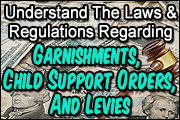Training For Illinois Garnishment Law Requirements
Training For Illinois Garnishment Law Requirements
 What Is A Garnishment?
What Is A Garnishment?A wage garnishment is any legal or equitable procedure through which some portion of a person's earnings is required to be withheld by an employer for the payment of a debt.
The six basic types of garnishments are child support, federal, state, or local levies, creditor garnishments, and student loans, with the largest amount of garnishments being for child support.
Employer Guidelines For Handling GarnishmentsEmployers generally have to notify the debtor in writing that a wage garnishment is about to start before making a garnishment and sending payments to the creditor. The wage garnishment then typically continues until the debts are paid off or otherwise resolved. Employers are required to provide employees with a copy of garnishment paperwork.
Illinois Wage Garnishment Rules
Employers should be aware that there are two general types of garnishments, one for child support and one for creditors (commonly referred to as "levies").
Re child support orders, the maximum amount that can be withheld runs between 50 (if the employee is supporting another spouse and/or children) and 65% (if the employee is not supporting another spouse and/or children and is at least 12 weeks in arrears in making support payments).
About Child Support GarnishmentsWith regard to child support garnishments, all states are required to use the "Order/Notice To Withhold Income For Child Support" notice for Child Support. This notice is designed to provide employers with key information so that they do not have to decipher unfamiliar orders/notices from different states. Click
here for details on this notice, and see below for suggested steps to process this notice.
Suggested Steps To Process The Income-Withholding Order/NoticeUpon receipt of the Order/Notice to Withhold Income for Child Support, the employer should:
- Document the date of receipt
- Determine if the order is "regular on its face" (that is, it appears to be an authentic and complete legal document)
- Provide a copy of the Order/Notice to the employee if it has been issued by another state, and
- Follow the terms of the order
Employers should note that they cannot contest the income-withholding order; however, the employer should contact the issuing agency if unable to implement the withholding either because the individual named in the order is not an employee or a withholding is already in place for the child and employee. Additionally, employers should note that states often have varying garnishment rules, so they should be sure to know the payroll wage garnishments rules for the state(s) in which it does business.
About LeviesUnder Illinois law, the most an employer can deduct from an employee's paycheck for a garnishment is the lesser of up to 15% of gross wages or the amount of disposable income that remains after deducting the Illinois minimum wage (or the federal minimum wage if it's greater than the Illinois minimum wage) multiplied by 45.
According to both federal and Illinois law, employers cannot terminate an employee who has one wage garnishment. However, these laws don't apply to employees who have more than one wage garnishment order.
Below is a non-exclusive list of debts that may not require a Money Judgment and that can instead be enforced with an administrative wage attachment order:
- Court-ordered and past due child support
- Alimony or spousal support that is past due
- Federal, state and local fines
- Income taxes arrearages at the federal or state level
- Property taxes due at the state level
- Defaulted student loans
Recommended Garnishment Training Courses:
Find Seminars, Webinars, And Online Training In Your Area
Contact Info For Illinois Garnishments Law
JAMES R. THOMPSON CENTER - 7TH FLOOR
100 WEST RANDOLPH STREET
CHICAGO, ILLINOIS 60601-3274
800-732-8866
References and DisclaimersThis information is based on a variety of state laws and regulations, and is subject to change. The PayrollTrainingCenter makes every effort to make sure this information is current and accurate, however, the PayrollTrainingCenter is not engaged in rendering legal or professional advice and shall not be held responsible for any inaccuracies contained herein.


 What Is A Garnishment?
What Is A Garnishment?



